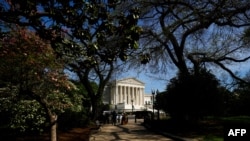An upside-down U.S. flag has long been a sign of dire distress and versatile symbol of protest. But in January 2021, when it flew over the home of Supreme Court Justice Samuel Alito, it was largely seen in connection with a specific cause: the false claim by then-President Donald Trump's supporters that the 2020 election had been marred by fraud.
The revelation this week about the flag flying at Alito's home was the latest blow to a Supreme Court already under fire as it considers unprecedented cases against Trump and some of those charged with rioting at the U.S. Capitol on January 6, 2021.
Alito has said the flag was briefly flown by his wife amid a dispute with neighbors and he had no part in it. But the incident reported by The New York Times adds to concerns about an institution that's increasingly seen as partisan and lacking strict ethical guidelines.
The high court is now facing questions about whether the spouses of two of its members question the legitimacy of the 2020 election, and if those justices should be hearing cases related to the January 6 riot and Trump's role in it.
Justice Clarence Thomas, appointed by President George H.W. Bush, faced calls for recusal after reports that his wife, Virginia Thomas, was involved in efforts to overturn President Joe Biden's 2020 election win.
"We're talking about a fundamental bedrock American value about peaceful transfer of power, about elections," said Tony Carrk, executive director of Accountable US, a progressive watchdog organization. "It's just the integrity of the democratic process."
Several Democrats in Congress, including Senate Judiciary Chairman Dick Durbin and House Minority Leader Hakeem Jeffries, called for Alito to recuse himself from Trump-related cases. Justices can and do voluntarily recuse themselves, but they make those calls and they aren't subject to review.
There was no indication Alito would do so. He did not respond to a request for comment sent through the court's public information office.
While the Supreme Court long went without its own specific code of ethics, an institutional reputation of staying above the political fray has long helped bolster its relatively high levels of public trust. But in the wake of the 2022 decision overturning a nationwide right to abortion — an opinion that was leaked before its release — public trust sank to its lowest level in 50 years. There's also been sustained criticism over undisclosed trips and gifts from wealthy benefactors to some justices. The high court adopted a code of ethics last year, but it lacks a means of enforcement.
Alito, a former prosecutor who was appointed by President George W. Bush and confirmed in 2006, has been one of the most court's most conservative justices and authored the decision overturning Roe v. Wade. During oral arguments in the election interference case against Trump, he appeared skeptical of Justice Department arguments that past presidents aren't completely immune from prosecution, and seemed one of the justices most likely to find that prosecutors went too far in bringing obstruction charges against hundreds of participants in the January 6 riot.
Ethical guidelines generally make it clear that judges should recuse themselves in cases where their spouses have financial interest, but the situation is less clear when spouses have a publicly known political point of view, said Arthur Hellman, a professor emeritus at the University of Pittsburgh School of Law.
Meanwhile, it remains unclear whether Alito was aware of the inverted flag at the time or its links to Trump supporters, said Stephen Gillers, a judicial ethics expert at New York University School of Law.
"I don't believe Alito knew the flag was flying upside down or if he did know, I find it hard to believe that he knew the relationship to "'Stop the Steal,'" he said in an email.
Martha-Ann Alito hung the upside-down flag during a dust-up with a neighbor in Alexandria, Virginia, who had a lawn sign referring to Trump with an expletive during a the "heated time" of January 2021, Fox News anchor Shannon Bream said in an online post, citing a conversation with Justice Alito.
Demands for recusals by justices and judges have been part of political disputes over the high court and elsewhere in the legal system.
But while a system exists for penalizing lower-court judges who are accused of conflicts or other wrongdoing, there is no mechanism to sanction Supreme Court justices.
Only Congress can impeach a Supreme Court justice, said Michael Frisch, ethics counsel at Georgetown Law. One justice, Abe Fortas, resigned from the Supreme Court in 1969 amid a controversy over receiving $20,000 from a Wall Street financier. An impeachment, though, has only happened once, to Justice Samuel Chase in the early 1800s. He was later acquitted by the Senate.





